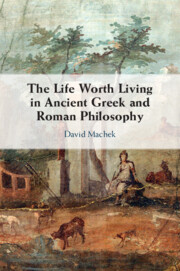Book contents
- The Life Worth Living in Ancient Greek and Roman Philosophy
- The Life Worth Living in Ancient Greek and Roman Philosophy
- Copyright page
- Dedication
- Epigraph
- Contents
- Acknowledgements
- Abbreviations
- Introduction
- Chapter 1 Plato on Making Life Worth Living by Doing One’s Job
- Chapter 2 Aristotle on the Natural Goodness of Life
- Chapter 3 Decoupling Happy Life from Life Worth Living in Stoicism
- Chapter 4 Threshold Nears the Target: Hellenistic Hedonists on the Life Worth Living
- Chapter 5 Peripatetics on Vicious Humans and Caged Animals
- Chapter 6 Plotinus on the Worth of Embodied Existence
- Conclusions
- Bibliography
- Index Locorum
- Subject Index
Chapter 3 - Decoupling Happy Life from Life Worth Living in Stoicism
Published online by Cambridge University Press: 29 April 2023
- The Life Worth Living in Ancient Greek and Roman Philosophy
- The Life Worth Living in Ancient Greek and Roman Philosophy
- Copyright page
- Dedication
- Epigraph
- Contents
- Acknowledgements
- Abbreviations
- Introduction
- Chapter 1 Plato on Making Life Worth Living by Doing One’s Job
- Chapter 2 Aristotle on the Natural Goodness of Life
- Chapter 3 Decoupling Happy Life from Life Worth Living in Stoicism
- Chapter 4 Threshold Nears the Target: Hellenistic Hedonists on the Life Worth Living
- Chapter 5 Peripatetics on Vicious Humans and Caged Animals
- Chapter 6 Plotinus on the Worth of Embodied Existence
- Conclusions
- Bibliography
- Index Locorum
- Subject Index
Summary
The Stoics break with Plato and Aristotle, who envisaged the value that makes a life worth living as a degree or part of the value that makes a life happy. Instead, they establish two separate axiological scales, one that determines whether a life is happy, and another one that determines whether it is worth living. The former contains virtue and vice, or what is good and bad, whereas the latter is defined by the so-called preferred and dispreferred indifferents, such as health, wealth or renown. This allows for the possibility that a virtuous and happy person sometimes ought to depart from life, when they do not have a prospect of a life worth living, while a vicious and unhappy person ought to stay alive, when they have such a prospect. This decoupling of the happy life from the worthwhile life is consistent with the Stoic view that life itself is a preferred indifferent, and hence the deliberations about staying alive should be referred to other preferred indifferents rather than to virtue and vice.
- Type
- Chapter
- Information
- The Life Worth Living in Ancient Greek and Roman Philosophy , pp. 99 - 134Publisher: Cambridge University PressPrint publication year: 2023

